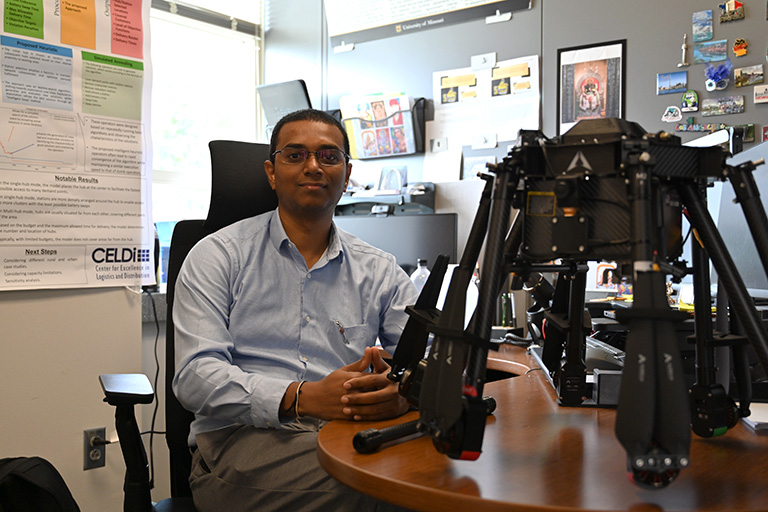August 14, 2024
One Mizzou researcher is developing a cloud-based route optimization platform to enhance operational efficiencies and reduce the environmental impacts of last-mile logistics.

In a significant advancement for last-mile delivery technology, Mizzou Engineering faculty researchers have secured a Partnerships for Innovation – Technology Translation (PFI-TT) grant aimed at optimizing the use of unmanned aerial vehicles (UAVs) and electric trucks. This initiative promises to address the pressing challenges of efficiency and sustainability in a sector critical to the burgeoning e-commerce market.
The global market for last-mile logistics, which constitutes 41% of total supply costs and significantly impacts global greenhouse gas emissions, is in the process of transformation. The project, spearheaded by Sharan Srinivas, assistant professor of industrial and systems engineering, aims to develop a cloud-based route optimization platform that will integrate drones and electric trucks into a cohesive delivery system, thereby enhancing operational efficiency and reducing environmental impacts.
“This innovative project tackles crucial technical challenges, such as the integration of vehicle routing and network communications. This ensures reliable and optimized routes for a scalable fleet of electric trucks and UAVs,” Srinivas said. “Researchers are developing new optimization models and heuristic methods tailored to solve the unique routing problems presented by these technologies. And the project incorporates dynamic routing models that leverage machine learning to account for variables such as airspace management, environmental conditions, and network communications.”
The benefits of this work extend beyond logistical efficiency. For last-mile service providers, the technology is expected to increase fleet utilization, reduce operational costs and enhance safety—all while significantly lowering the carbon footprint of delivery operations. The project’s environmental and economic implications align closely with global sustainability objectives, offering a greener, more cost-effective approach to delivery services.
“The application of this technology also reaches critical areas beyond e-commerce,” said Srinivas. “It includes crucial applications like medical deliveries, emergency responses and humanitarian operations. This versatility underscores the potential of the technology to become an essential tool across various sectors, providing reliable and efficient delivery solutions.”
By integrating advanced UAV and electric truck technologies, this project not only sets a new benchmark for logistical efficiency but also enhances the economic competitiveness of the United States in the global marketplace, promising a more sustainable and efficient future for delivery services.
This effort builds upon a related project by Mizzou Engineers focused on optimizing delivery routes using electric vehicles and drones, addressing the costly and environmentally impactful last-mile delivery segment.
Suchi Rajendran, an assistant professor of industrial and systems engineering, and Prasad Calyam, Greg L. Gilliom Professor of Cyber Security, are co-investigators on this project.
Transform your passion into impact! Apply to Mizzou Engineering and tackle real-world challenges.